“For some, the night can be a haunting place, where they are left alone with their thoughts as the world around them does to bed. Making them feel more alone than ever.” – Samaritans Of Singapore
Tag: #death
In Dielogue: Marilyn
Personal encounters of witnessing death often makes the topic of death much more real and close to heart. We know that death happens to everyone, but we never know when and where. In this series of Dielogue, we share the heartfelt personal experiences of a healthcare practitioner, who meets patients near their end of life.
Meet Marilyn Ho, an Advance Care Planning (ACP) Coordinator in Tan Tock Seng Hospital. Her job allows her to meet people and hear about their lives, values and experiences. She facilitates difficult conversations on healthcare and death, and also discusses with people about future healthcare preferences.
“The goal is not ‘getting comfortable with hard conversation’ but ‘normalising discomfort’. It’s very humbling when they trust us and share their life stories with us.”
When did you first join the medical industry as a nurse?
I first joined the healthcare industry as a full time registered nurse in 2012. Tan Tock Seng hospital was where it all started for me. I was initially given a post in the clinic with regular office hours but all I wanted at the point in time was to work around the clock in a general ward. I wanted to change diapers, shower the patients and be on the ground. After weeks of speaking to many people, I finally got a transfer a month later. I was so happy.
While working in a general medicine/cardiovascular ward, I found my passion to be taking care of elderly patients and patients at the end of their lives. While taking care of dying patients and their family, I felt a great sense of pride to be able to be there for them during one of their most vulnerable moments. I’d volunteer to do last office* for patients who passed on. I think it’s an honour to deliver good professional care to the dead and bereaved family. How you respect the deceased makes a lot of difference to the experience of their families, and the experience stays in the memory of the ones who live on.
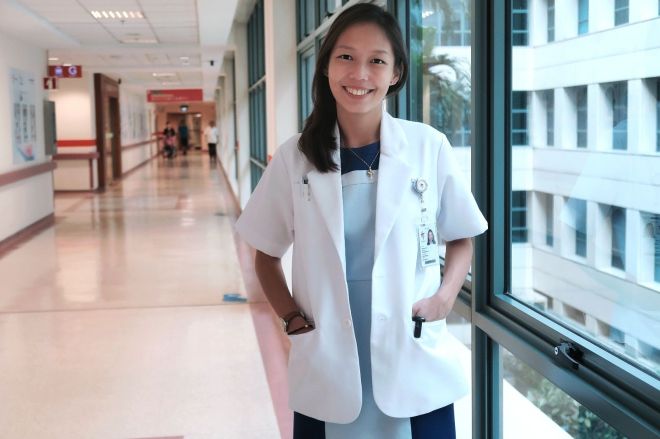
“We celebrate lives when they arrive in this world. In my opinion, we should celebrate even more when we leave – for the good lives we have created, the people we have crossed path with and the lives we have touched.”
Any specific incidents on the job that changed or left an impact on you?
The first death that I witnessed was an 18-year-old young man who died from drug overdose. I was in my first year of nursing school and I was by his bed when he took his last breath. I was tasked by the staff nurse to keep a look out for this patient and make sure he was comfortable till his family arrived. He was sweating profusely and was breathing in a strange manner that I didn’t understand. I prepared a standing fan for him and screened the curtain, then I held his hand and asked him to hold on while watching his irregular and weak heart rhythm on the screen. His breath became more and more shallow and he passed on before his family arrived. I remember vividly the look on his face at his last breath.
When his family came, I recalled their sadness and his mum fell to knees by his bed. Her anguished cry still rings in my ears when I think about it now. They requested to speak to me as they wanted to know how he was before he left. I was shaken but I told them all. His mum hugged me and we both teared. His last breath was the beginning of my new life. Many other experiences after that changed me progressively.
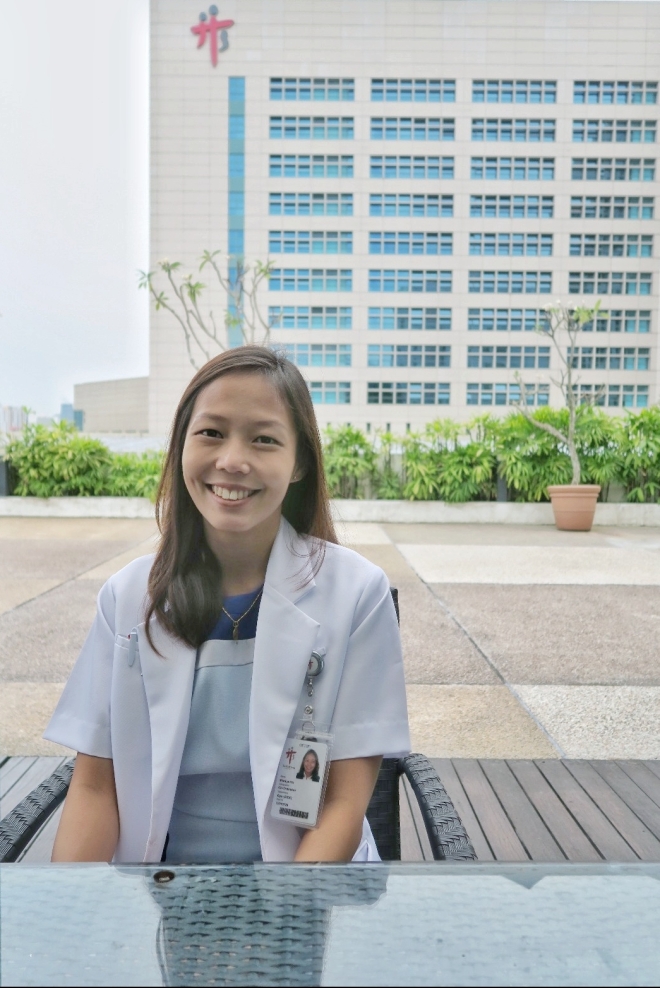
Patients were my best teachers. One of my ex-patients was a 35-year-old lady with stage 4 breast cancer. When I interviewed her for a research study, she said:
“Marilyn, I wish I were young again and I wish someone told me this – It’s good to have goals in life, but we are sometimes so obsessed with materialistic satisfaction, we squander our money, we waste our time. All the money I have now, buy me no cure and no time, and worst of all, they cannot help to buy my daughters’ memory of their mother. My kids might just grow up not remembering me at all. If I can give you one piece of advice, money is important but it isn’t everything that you should set your mind and eyes on. You need to set your priorities right, live in the present and live right, be nice and be kind.”
That was an ordinary day in July 2016 which completely changed my perspective.
If you had 30 days left to live, what would you do?
If I had 30 days left and I can still walk around, I would want to go for long walks in the nature. I would want to spend some time with myself, reflecting back on my life, finding peace and getting ready for my departure. I will spend time with my family, creating new memories and looking at my childhood pictures. I will hope to have a party too, where I gather all my closest family and friends to celebrate my life, with wine and balloons, and a live band as well. People would be invited to give speeches or deliver eulogies for me. I would wish to listen to them before I die. I would cry, everyone is allowed to cry as well. As Queen Elizabeth II once said – “Grief is the price we pay for love”.
*The last offices, is the care given to a body of a dead person shortly after death has been confirmed.
The Good Death seeks to transform the negative notion of death itself and is focused on promoting early planning for one’s end-of-life care, especially so for adults over the age of 50. Find out all about The Good Death, ACP and Palliative care here!
In Dielogue: Venerable Ming Fa X Angjolie
We’re often caught by the element of surprise when driven from a sudden death of our loved one; or even from someone whom have been living their life dilligently – only to pass away abruptly through an incident. The moral of the story is that – death is unpredictable and we can only prepare for it. We talk to two promising figureheads to find out what is a life worth living and how to prepare our loved ones and ourselves for death.
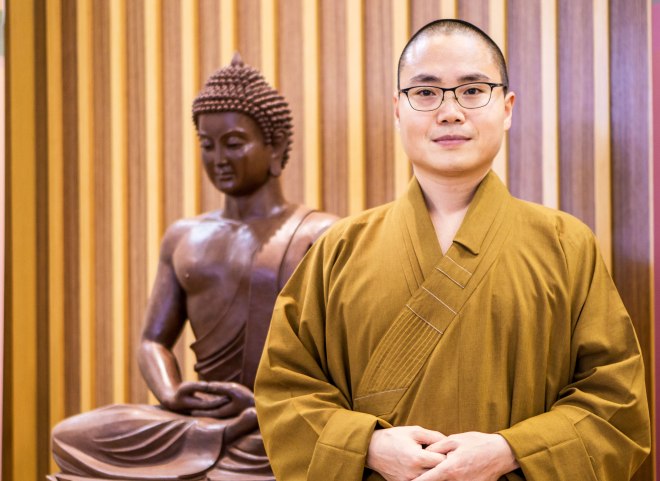
Meet Venerable Ming Fa, from Kong Meng San Phor Kark See Monastery. His role is to teach and propagate the teachings of the Buddha.
What is a life worth living?
Before we determine a life worth living, we need to understand what is the notion of a ‘worthy life’. In Buddhism there are three levels of attainment of a ‘worthy life’. The first level is the ‘Human- Heavenly Path’ (人天道) 。It relates to the pursuing of basic needs such as well-being, health, happiness and fortune towards a better life. The next level is ‘Path of Liberation’ (解脱道) which is learning the teachings of Buddha by putting it in practice, abiding the precepts, mental development through meditation in order to transcend the cycle of life and death. The last level is ‘Path of Bodhisattva’ (菩萨道), where one seeks to unshackle from the cycle of birth and death and at the same time deliver others from their suffering.
Based on the above, we can also apply the same principle of life in general. Firstly, we strive to attain self-advocacy in fulfilling our needs, wants and goals. Next, we will then strive to provide for our family and loved ones, fulfilling their material and emotional needs. Lastly, we will strive to contribute to the society and advocate for the wellbeing of others.
A life worth living encompasses a positive outlook in life and bringing wholesome influence to our family and loved ones. Buddhism also emphasize on developing wisdom, understanding of self, others and having clarity and understanding to chart your own path.
What should we do if we only have 30 days to live?
Venerable Ming Fa: If we are only left with a few days to live, we should spend some time to reflect upon significant events in our lives, both pleasant and unpleasant ones, which may evoke strong emotions and feelings. There may be regrets such as not being able to reconcile with those that we are estranged from; or guilt that may have been buried deep down and only resurfacing when we’re reflecting in our last days. We could strive to achieve closure or accept what could not be changed.
That is why it is important for us to help our loved ones fulfil their last wishes and make peace with themselves to allow them to pass on peacefully without regrets. No matter which religion you believe in, you need to understand life as a natural and transient process, strive towards acceptance and live a worthy and fulfilled life.
According to Buddhism, death is both an ending of this life and beginning of the next life. There is no need to be happy or sad, as it is a natural process.
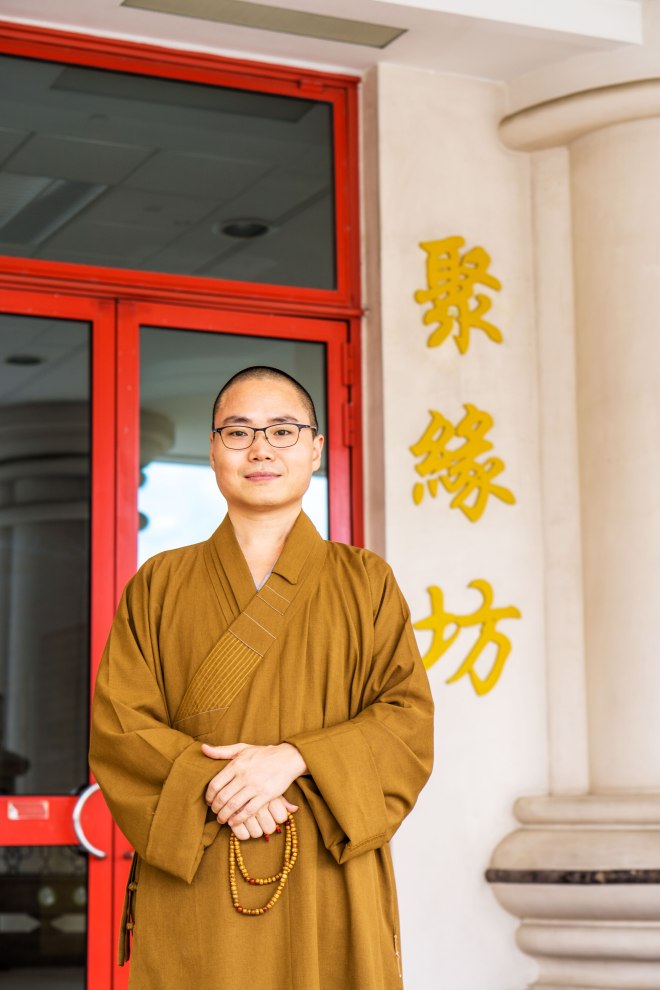
“Death is not an ending, but it’s a new beginning. There’s no need for sorrow as death is a natural process.’ – Venerable Ming Fa
Venerable Ming Fa: We need to have a clear understanding of what life entails. Life is a continual process. No matter which religion you believe in, you need to understand that life is only a process towards death and life is fleeting. It is about learning to understand that life and death is a natural process. We can only live our lives more fruitfully by understanding the process of death and accepting it.
An emperor hopes to live forever but he cannot alter the course of life in his goal to uncover immortality. If life is a process, how do we make it more fulfilling? Once a new life is born, death is like a constant that is unstoppable once it is set into motion. If there’s a beginning, there’s always an end. A new death means a new birth on another side. There’s no need to be happy or sad, as this is a universal phenomenon.
More about Kong Meng San Phor Kark See Monastery: https://www.kmspks.org
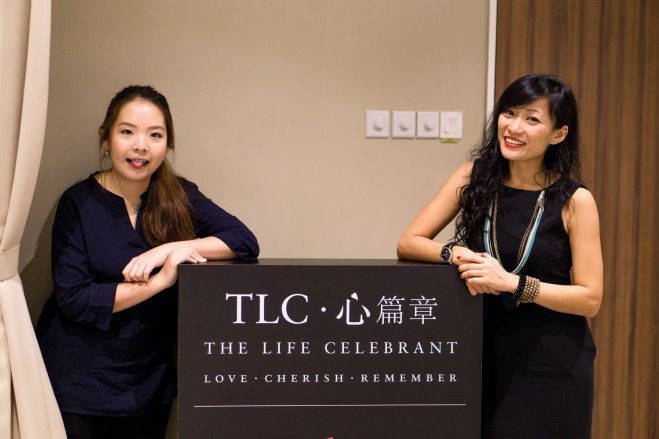
Meet Angjolie, the founder of The Life Celebrant. The Life Celebrant aims to celebrate and commemorate how you lived and leave your life, by providing customised and meaningful funeral planning and preplanning services for individuals and families. Taking over from her father’s funeral parlour, she has since put in her own personal experience and what she has learned from her education overseas – to shape The Life Celebrant.
Angjolie: I hope to get people to open up on the topic of death and be remembered as someone who has made an impact on their life. After attending a few seminars, I’ve learned that – no one can make you inferior without your consent. People may give advices to put you down by doing it subtly, in deameaningdemeaning your worth and using words to hurt you. If people choose to step on you, would you let them do so? They do it to you because they areir having a bad day or they do it not knowing that they areir actually bullying you. Thus I hope to be someone inspiring and be able to make an impact on people’s lives.
What do you wish people knew more about Advance Care Planning(ACP)?
Angjolie: Currently, we’re doing a lot of talks and we’re also encouraging people to start doing ACP; under our sister company known as The Life Legacy that deals with helping families to handle the legal parts of their estates after the funeral. There are many parts aboutin death that people don’t understand about. From doing your own insurance or the fact that you may get ill and not be able to speak out your own wishes. Our tagline is ‘Your Voice, Your Signature and Your Legacy’, as we want to empower people to voice outr their opinions and take control of their life and death. The Life Legacy deals with legal matters to aid families with the aftercare planning of a funeral. Usually wWe do work with a lot of hospices as well and they usually refer families to us. based on a case-by-case basis as well.
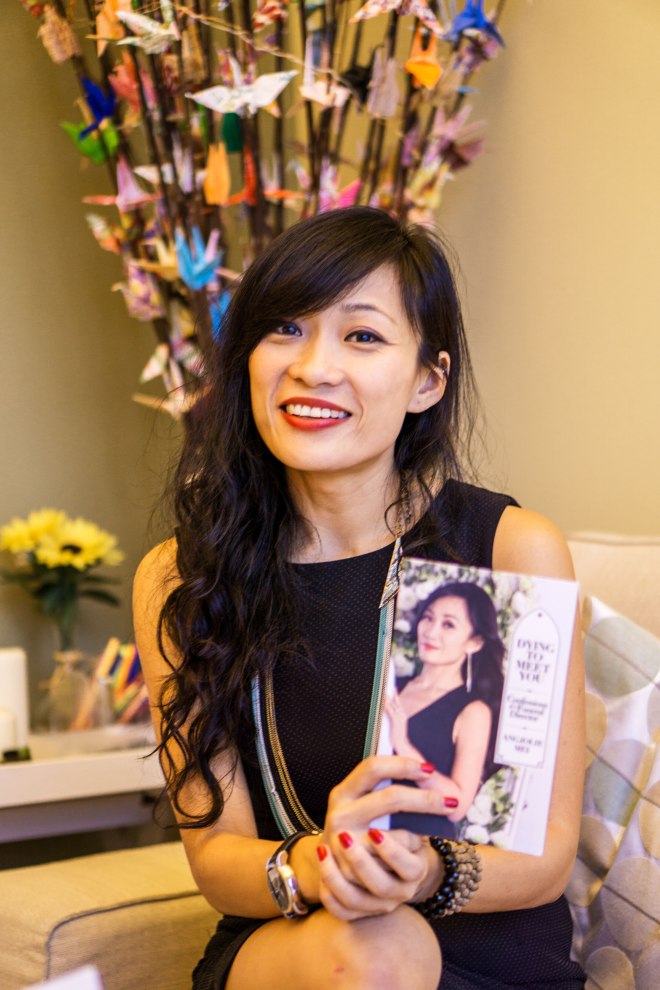
“A funeral has no rewind. You can’t say that you make a mistake afterwards.” – Angjolie
Angjolie: When a funeral is done, cremated orand buried – there is no room for a mistake to be made. The work we do is akin to working on an airplane. We need to do the safety checks with the plane and all the crew on board to ensure that everyone does their job well. The pilot and co-pilot would be the funeral director and care specialist, while the other people in the funeral are the cabin crew and passengers are your attendees. We need to ensure that the plane flies and land safely. I designed this room in The Life Celebrant, as a lounge for families to relax and be comfortable enough to talk about their shared memories and experiences. Thus I believe a funeral is not a day in a lifetime – but a lifetime in a day.
There was once when I came to learn about the story of my father’s generiositygenerosity, through my father’shis friends. I always knew my father as a quiet man due to ourthe generation gap we shared, andbut was surprised when they told me he was both a humorous and generous man. He would always give red packets to the old chefs and workers that were working in his friend’s restaurant. I shared this story withto my 11-year-old brotherbrother and was surprised when my he11 year old brother came home and told me that he gave money to his friend. I asked him why and he said he gave it to his friend because his friend had no money to buy a drink. I was very touched by this and it was one of the reasons that inspired me to begin The Life Celebrant.
More about The Life Celebrant: http://www.thelifecelebrant.sg
The Good Death seeks to transform the negative notion of death itself and is focused on promoting early planning for one’s end-of-life care, especially so for adults over the age of 50. Find out all about The Good Death, ACP and Palliative care here!
In Dielogue: Magdalene X Nash
Patients with terminal illness may be reaching the end of their lives, but palliative care is all about helping them live despite of and with the terminal illness. Much can be achieved by physiotherapists in the areas of pain and breathlessness, as they help with functional decline and improve the sense of well-being.
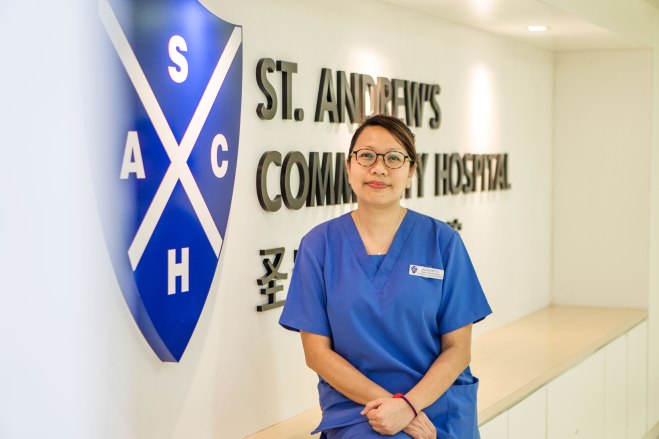
Meet Magdalene Tan, Senior Physiotherapist at St. Andrew’s Community Hospital. Her main role is to help palliative care patients in improving functional mobility and controlling symptoms.
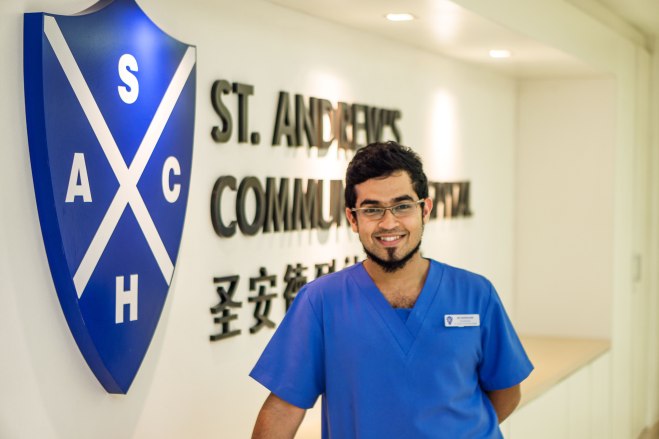
Meet also Muhammad Nashiruddin, Physiotherapist at St. Andrew’s Community Hospital. He has been working as a physiotherapist for 2 years and has recently taken up the same role in palliative care.
What is a life worth living to you?
Magdalene: Living your life to the fullest, and leaving a legacy for my family.. I have children, so I want to be known as a loving mother, and to be a good role model for them. In turn, I hope they could contribute to society. I also want to be a good role model to the physiotherapy students I train, teaching them to provide love and support for our patients. I hope to inspire my students and convince them to work in this line in the future as physiotherapists.
Nash: If we can make a positive impact on people’s lives – that to me is meaningful. Helping my patients recuperate and reducing their suffering gives my life meaning, especially when I know that I’ve managed to help them or lessened their suffering. As you go through your life,, you want to not only have a positive impact on other people’s lives, but keep on doing it so as to help more people.
“Does it have to take a prognosis of dying to start this conversation?” -Magdalene
Magdalene: Dying can happen anytime, whether abruptly or over a prolonged period. The most common thought that people usually have before they die is that they want to make peace with their family members and friends before they pass on. There are situations where patients continue to be estranged from their families till the time they die, and thus at the end, they they are left with regrets of how things could have been. Do not wait for a health crisis before you start to be loving and make peace with your family members and friends.
Nash: It is my personal belief that the most important thing about dying is to check and evaluate yourself to see if you are prepared for it. I’m not worried about talking to my family about death. I’m not afraid of dying, as it’s a natural process. If you are prepared spiritually and emotionally, then you will be ready to go.
To me, death is a blessing when you are spiritually and emotionally prepared. If you have done what is necessary, then it will be sufficient to know that you have done your best. It’s like studying before an exam and then knowing the exam is nearing an end when the final bell rings. Being prepared spiritually, would mean getting right with God or making up with family members. Being prepared emotionally would mean managing the emotions you have and having the peace that comes from knowing that you have done your best to contribute towards society.
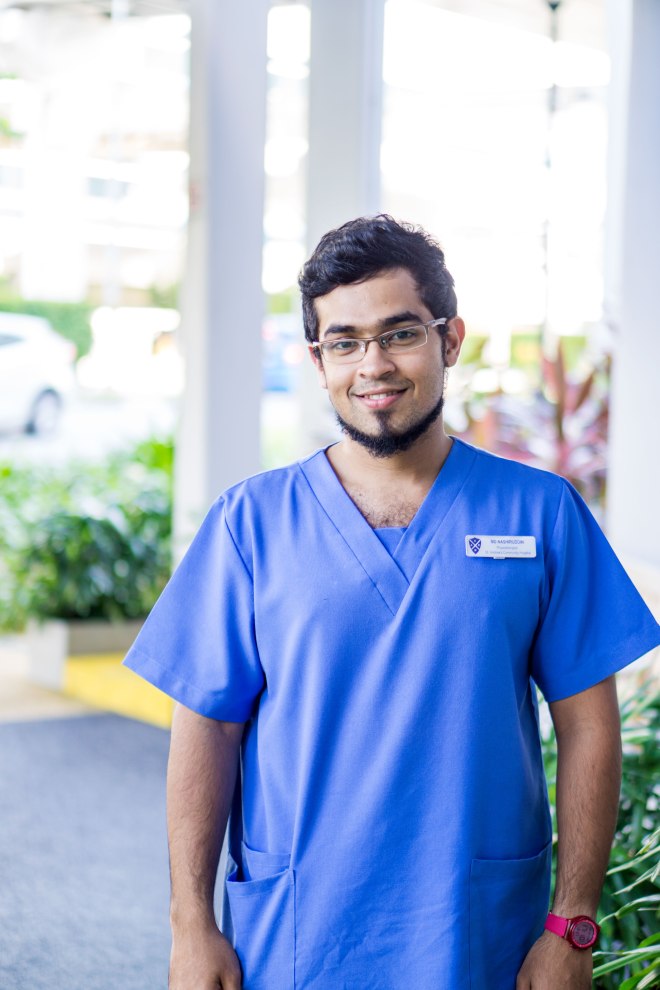
“People think that palliative care settings are places to go to die, but that is a misconception.”– Nash
Magdalene: Our role is not just helping the person recover physically, but also holistically focusing on the person’s mental and spiritual well-being. Spirituality is not just religion per se; it is about obtaining answers to the meaning of life and self-identity. We want to help the person live a good life till the end. The definition of a good life is for the individual to define and decide on, not the healthcare professional nor the family members.
Nash: Palliative care is where the professionals do their best in giving more meaning to the patient’s life. It’s not a place for suffering till the end of life, but for getting help and having meaning to your final part of life. We aim to prioritise the patient’s comfort. People think it’s a place to die, but that is a misconception. We give therapy based on their capacity and it’s a place for the patient to feel comfortable and relaxed.
The Good Death seeks to transform the negative notion of death itself and is focused on promoting early planning for one’s end-of-life care, especially so for adults over the age of 50. Find out all about The Good Death, ACP and Palliative care here!
Angjolie’s Good Advice
Meet Angjolie, the founder of The Life Celebrant. The Life Celebrant aims to celebrate and commemorate how you lived and leave your life, by providing customised and meaningful funeral planning and preplanning services for individuals and families.
TELL US ABOUT YOURSELF IN 1 LINE.
I’m a determined and perseverant person. If there is something I want to do, I’ll put my mind to it and finish it all the way.
TELL US SOMETHING MOST PEOPLE MIGHT NOT KNOW ABOUT YOU.
I enjoy salsa dancing as it’s a big part of my life. It’s an outlet for me to relieve stress and playing piano is another avenue for me to destress. People may think that I’m an extrovert, but I do need my alone time to think and I believe I’m more of an introvert-extrovert.
WHAT’S THE BEST PIECE OF ADVICE YOU’VE EVER RECEIVED?
One good advice that I’ve applied to my life motto, is to use this four phrases everyday ‘I’m Sorry, I Forgive You, I Thank You and I Love You’ and it means a lot to me. Before I end my day, I will contemplate these four phrases and who I would need to say it to. In chineseChinese family, we tend to not verbalizse our love for each other. SomtimesSometimes we may even take our loved ones for granted. These four phrases allowsallow me to remain grounded since I will settle any existing problems on the spot and not leave them hanging, by seeking for forgiveness, by apologiszing when my actions hurt someone, by saying thanks generously and lastly saying I love you to the person I love.
TELL US ABOUT A TIME WHEN THIS PIECE OF ADVICE CAME IN USEFUL.
An episode I recalled that impacted me, was when a young lady came to our premises and who requested to open her grandmother’s casket to and see her grandmother for the last time. She asked for a private moment with her and I granted it. The door was left ajar and I was watching it from the CCTV outside. I saw her apologizsing profusely to her grandmother, with tears streaking down her face and that was when the moment hit me. It dawned on me that I didn’t want to be in the same plight to regret not having the chance to apologisze and make up with my loved ones. After that particular episode, whenever I argue with my mother, I never fought back as I don’t want to hold anymore regrets.
In Dielogue: Loretta X Charmaine
Delving into the social sector, requires a set of demanding aptitudes. Social workers are expected to handle different situations – from extending a willing pair of ears, to getting reprimanded by patients and riled into family conflicts. What makes us human is the ability to empathize and give advice – and that’s what our care practitioners have dedicated their life towards. At the end of the day it’s about learning – to make human connections.
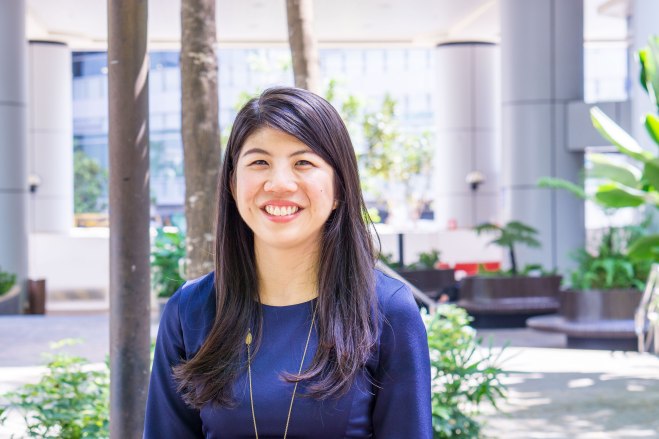
Meet Loretta Chan, Advance Care Planning Counsellor, Medical Social Service, Changi General Hospital. She facilitates the vital communication between patients and their families or loved ones about their medical conditions and preferences, to help the family be better prepared of the road ahead. She enjoys bridging conversations and understanding from people about what matters most to them.
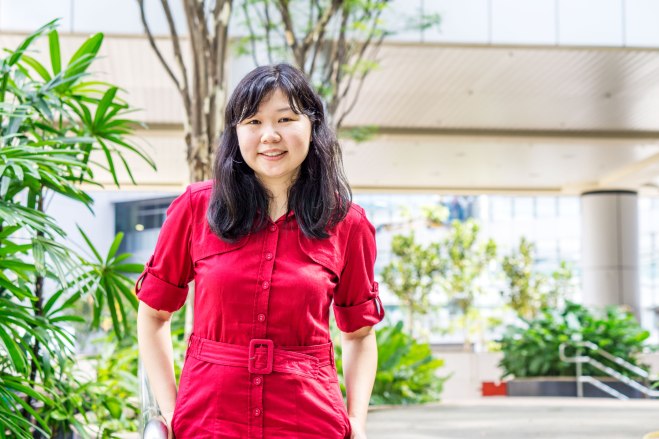
Meet Charmaine Tay, Senior Medical Social Worker, Medical Social Service, Changi General Hospital. She’s heavily involved in the inpatient setting, in assisting patients with financial needs, care planning and motion support. The dynamic nature of her work, involves assisting doctors and therapists to evaluate the needs of patients amidst the myriad of challenges that comes along.
What does a life worth living to you look like?
Loretta: Having a job that I like and getting satisfaction from what I do in my career that is a life worth living to me. More importantly, knowing that I’ve made an impact in somebody’s life and having a good network of support from family and friends. There are a lot of things that we easily take for granted, such as the idea of simply heading out for a meal. You hear how patients often feel cooped up at home, especially when they want to go out but no longer has the means to do it.
Charmaine: Being happy with what you are doing is important; I feel lucky to be in a good space, family and loving relationships, with a job I find meaning in. I can wake up happily every day to face challenges at work, instead of dreading work. And that to me, is a life worth living.
What do you wish more people knew about Advance Care Planning(ACP)?
Loretta: People have different perspectives of ACP and may lack understanding about the topic, thinking that it’s only for the elderly. But in reality, ACP is applicable for everyone. For me, I feel that ACP is extremely relevant as I would have already told my family on what my decision would be, should an accident happen to me. There are some preconceived misconceptions, where people think that ACP is a way to discharge people out of the hospital. But at the end of the day, you are the one that gets to choose your own options. We usually do ACP based on referrals, where the doctor will only recommend it, when the patients are ready to talk about it.
Charmaine: If making everyday decisions mean a lot to you in life, from what to wear, to where to eat next or what movie to watch, then wouldn’t you want to control a more significant part of your life? Generally, people are afraid because some may be superstitious as there is a lot of unknown in death, religion aside. If we make our own decisions, we relieve the burden and fear of family and friends, while lessening the fear towards death.
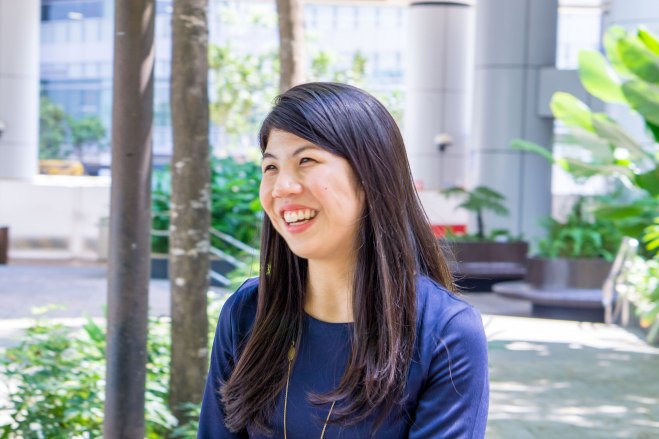
“People think that dying is their own choice, but it not only affects us but the people who love us equally – such as our family and friends.” – Loretta
Loretta: People talk about afterlife only in religion, but it’s something that can’t be controlled. Rather than to rely on the unknown, I prefer to take charge of my own life. People think that dying is their own choice, but it also affect the people who love us equally – such as our family and friends.
If you mention (about dying) in advance, things will change for both you and your family as they become more reassured in the process. Healthcare is very common, yet it’s uncommon to talk about end of life and palliative care. When people don’t talk about palliative care, there tends to be a misconception of it, because they don’t understand the topic. They just have the concept that dying is very far away.
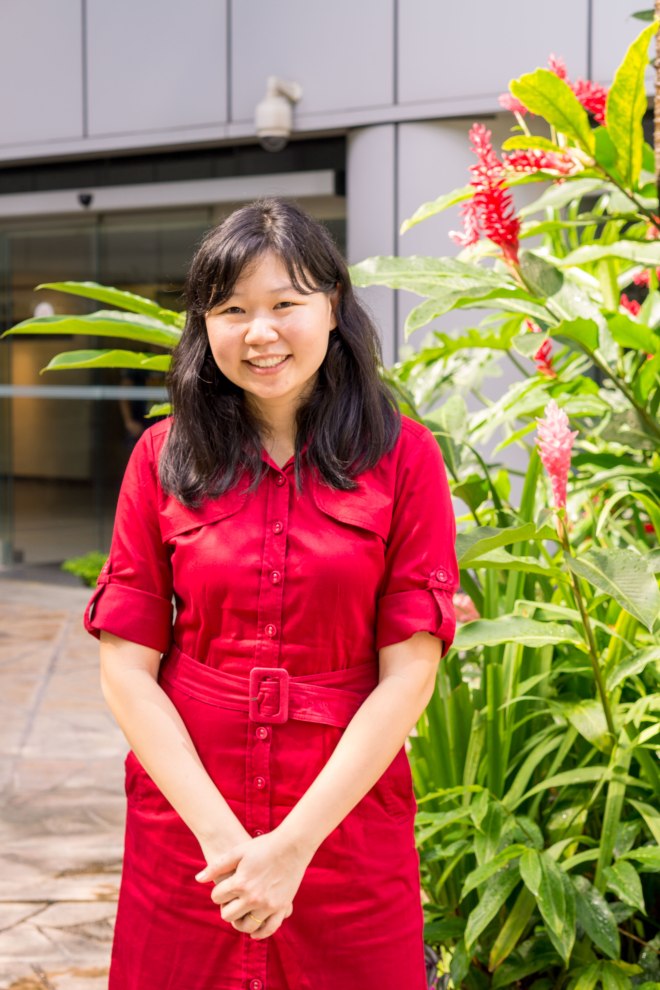
“The hardest decision always falls on the family and we understand that it’s always hard to persuade the family to let go – especially when it’s someone we love.” – Charmaine
Loretta: As an ACP Counsellor, I speak to the families of patients with chronic illnesses and other deteriorating diseases daily on their medical preferences, to help them be better prepared and ensure sufficient time is taken to evaluate their medical needs. Patients who know their condition well are more open to talking about it. The difficult part is talking to the family and getting them to accept the decisions.
Charmaine: It only becomes tricky when the patient has no idea about the right decision to make for himself or herself, or when they are no longer in the right frame of mind to decide. It is common to have differing opinions within the family on what the best decision will be, and that often results in conflicts and unwanted arguments.
It’s good to prepare for your death and know what exactly you want or don’t want. For some people, they want to be saved right till the very end no matter what happens. For myself, I’ll prefer to opt for comfort care as I don’t like pain. If I’m old and weak and if there’s still a choice for me to go through resuscitation or other procedures; I will refuse it as I believe it to be more of a hindrance as I hope to have a pain-free death. Thus it’s important for us to have the conversation with our family to understand what are their opinions and learn to accept and understand where they are coming from.
The Good Death seeks to transform the negative notion of death itself and is focused on promoting early planning for one’s end-of-life care, especially so for adults over the age of 50. Find out all about The Good Death, ACP and Palliative care here!
Loretta’s Good Advice
Meet Loretta Chan, Counsellor, Medical Social Service, Changi General Hospital. She’s an advance care planning counsellor and mainly speak to the family and patients to find out what their medical preferences are to assist them in their decision.
TELL US ABOUT YOURSELF IN 1 LINE.
I’m a positive and approachable person, as I enjoy hearing people’s life stories and I believe it’s a privilege when people choose to confide in me.
TELL US SOMETHING MOST PEOPLE MIGHT NOT KNOW ABOUT YOU.
I enjoy exercising and usually I will go for either yoga or tennis with my friends. Another item in my bucket list, would be to travel around the world to take all the different roller coaster rides as I love the adrenaline rush that comes with it.
WHAT’S THE BEST PIECE OF ADVICE YOU’VE EVER RECEIVED?
My supervisors and mentors have also advised me not to take negative emotions directed at me too personally. Their frustration usually stems from their illness, so we shouldn’t take it too personally. Its hard not to get affected sometimes, but its good to know that they don’t mean it as it’s part of the illness as well.
TELL US ABOUT A TIME WHEN THIS PIECE OF ADVICE CAME IN USEFUL.
One person’s pain, can be someone’s blessing. Everyone has different definition of what is good for them. Person A may feel that coming to the hospital is good, as there are care and support being given and they have the mentality that they will get better. Person B may rather choose to stay at home as their more comfortable at home than at the hospital. Thus we should learn to not let negative emotions get the better of us and to learn to manage our emotions.
Charmaine’s Good Advice
Meet Charmaine Tay, Senior Medical Social Worker, Medical Social Service, Changi General Hospital. She helps patients’ cope with financial assistant needs, psychological support and evaluating the kind of assistance they may require. She works with doctors and therapists to make sure that patients are well cared for, even after they leave the hospital.
TELL US ABOUT YOURSELF IN 1 LINE.
I’m a practical optimist, you hear stories of problems and suffering all the time, so I have no choice but to remain grounded and do what I have to do.
TELL US SOMETHING MOST PEOPLE MIGHT NOT KNOW ABOUT YOU.
I have a keen interest in theatre and I used to teach speech and drama for children from pre-school to the secondary level. That has been on hiatus for now, although I do intend to go back to continue doing it when I have the time. I love musicals, so I have a huge respect for those possessing the ‘triple-threat’ qualities that are required in musicals, which are singing, dancing and acting. It’s nice to hear how emotions and feelings are conveyed through songs and dramas as well.
WHAT’S THE BEST PIECE OF ADVICE YOU’VE EVER RECEIVED?
I always try to think on the bright side of things. I believe how there is always a light at the end of the tunnel and a silver lining among the clouds. Sometimes, things do get better and you just need to shoulder on and press on. Do whats right and you can never go wrong. When there are challenges thrown to you, if you can keep to doing what’s right and necessary – then you’ll stay on the right path.
TELL US ABOUT A TIME WHEN THIS PIECE OF ADVICE CAME IN USEFUL.
Despite all the challenges that surfaced when I work with patients, sooner or later the problem does resolve itself. There are constantly alternative plans coming in or something unexpected always crops up. But it’s never a dead end and that’s how I deal with life. Life always goes on, you won’t be stuck forever at a certain problem or situation.
Magdalene’s Good Advice
Meet Magdalene, Senior Physiotherapist, St. Andrew’s Community Hospital. Her main role is to help patients in promoting functional mobility and palliative care at her work.
TELL US ABOUT YOURSELF IN 1 LINE.
I would like to say that I have a positive outlook in life, and I don’t sweat the small stuff.
TELL US SOMETHING MOST PEOPLE MIGHT NOT KNOW ABOUT YOU.
A lot of people don’t know that I like to dance. I enjoy keeping myself active in both dancing and swimming. I enjoy freestyle dancing and enjoy the occasional musical along the way.
WHAT’S THE BEST PIECE OF ADVICE YOU’VE EVER RECEIVED?
Someone once told me not to worry so much and not to sweat the small stuff. Whether you worry or you don’t, you still have to pass each day at a time. Don’t worry about the future and accept each and every challenge as it is.
TELL US ABOUT A TIME WHEN THIS PIECE OF ADVICE CAME IN USEFUL.
Working as a physiotherapist, there are always challenges happening daily. There are many things to worry about; from the patient’s recuperation rate to the various ongoing projects happening. I’ll worry about not having enough time to finish everything; but I’ve learned not to be a worry-wart and to live each day at a time. I’ve learned to become more flexible, so that I can learn to manage my time better too.
Want to find out more about his story? Stay tuned to his full interview and follow the Facebook page here to find out more about what The Good Death is all about!









